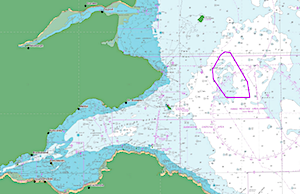Mainstream Renewable Power said it finally received the go-ahead for the 450 megawatt, £2 billion Neart na Gaoithe offshore wind farm off the coast of Fife.
Work is expected to start on the project in 2018.
“The Supreme Court’s decision to refuse RSPB Scotland’s application to appeal the Scottish Court’s earlier ruling clears the way to proceed with the construction of the 450MW Neart na Gaoithe (NnG) offshore wind farm,” said Mainstream Renewable Power.
Mainstream CEO Andy Kinsella said: “After more than two and a half years, two court hearings and two rejected applications for leave to appeal by RSPB Scotland, we can finally focus on delivering the very significant benefits this project brings to the Scottish economy and its environment.
“The NnG wind farm will displace 400,000 tonnes of CO2 each year.
“The RSPB has already delayed the project by two and a half years, during which time it could have displaced approximately one million tonnes of CO2, making a very significant contribution to the Scottish and UK Governments’ energy and climate targets.
“Once constructed this £2 billion project will be capable of supplying 325,000 homes – a city the size of Edinburgh – with clean energy.
“A study by the Fraser of Allander Institute shows the project will create 2,000 jobs each year during its four year construction period as well as hundreds of permanent jobs once operational.
“The project will bring £827 million directly to the Scottish economy over its lifetime.
“We are delighted with the decision and look forward to working constructively with RSPB Scotland to take the wind farm into construction next year.
“This project was consented by Scottish Ministers in October 2014 on the advice of Scottish Natural Heritage and Marine Scotland.
“We have been rigorous in our approach throughout the project, working with partners and supply chain businesses to find the best possible way to deliver the project.
“We look forward to seeing NnG up and running.
“We have taken advantage of significant advances in wind turbine technology allowing the number of turbines to be reduced from the 125 in the original design to a maximum of 54 today.”
Anne McCall, Director of RSPB Scotland, said: “RSPB Scotland is extremely disappointed by the Supreme Court’s decision to refuse permission to appeal the recent Inner House, Court of Session Opinion.
“We have worked on the Firth of Forth and Tay projects for nearly a decade to try and ensure that they progress without causing unacceptable harm to our internationally important seabird colonies.
“Despite our efforts, these projects were granted consent by Scottish Ministers in 2014.
“The Minister’s own assessments spelt out huge risks to seabird populations, including to puffins, gannets and kittiwakes which nest on our coasts and feed in the shallow waters in and around these projects.
“If these consents and their predicted impacts are realised, there is little doubt these would be amongst the most damaging offshore windfarms for seabirds in the world.
“In addition to these enormous risks to wildlife, we had major concerns with the assessment methods and the approach taken by Scottish Ministers.
“Due to these concerns RSPB Scotland felt there was no other option but to judicially review the Ministers’ decisions.
“In light of this refusal for permission to appeal we will be taking some time to consider all other options remaining to us.
“However, we are extremely disappointed with this decision, following nearly a decade’s worth of effort from RSPB Scotland to help deliver offshore wind in Scotland in a manner that respects one of the country’s most impressive and internationally renowned natural assets — its fantastic seabird colonies.
“And, perhaps most worryingly, it could also set an extremely dangerous precedent for decision-making on future development, whereby Scottish Ministers no longer need to take heed of their own expert nature conservation advisors (Scottish Natural Heritage), nor the concerns of the public or indeed consider the implications of development on areas known to be of international importance to wildlife.
“RSPB Scotland will continue to work constructively with the developers and the Scottish Government to try to ensure that the major impacts of these projects or any updated projects for these sites on seabirds are mitigated as much as possible.
“We will also continue to seek solutions to tackle the effects of climate change – one of the greatest threats to our natural environment and wildlife – that do not cause additional damage to some of those very things we are seeking to protect.
“Scottish Ministers have made many welcome statements about the value they place on being seen to safeguard Scotland’s environment.
“We would call on Scottish Ministers to put those words into action and ensure that improvements are made to Scotland’s planning and consenting processes to ensure that such damaging consents cannot be issued in future.”
